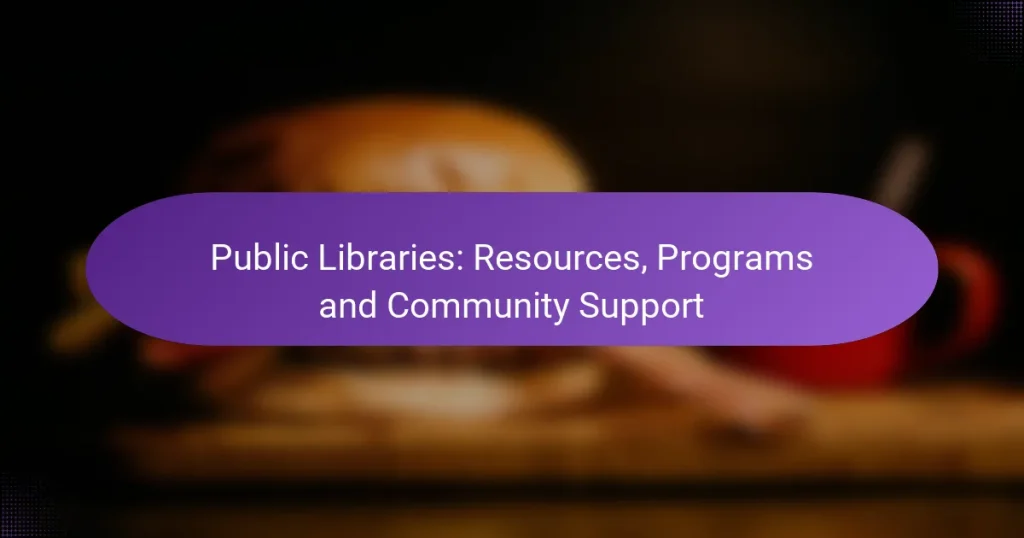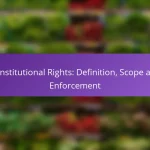Public libraries serve as vital community hubs, offering a diverse array of resources that support education, research, and engagement. From physical and digital materials to technology services and community programs, they cater to the varied needs of their patrons. Additionally, libraries provide essential support services aimed at enhancing literacy, aiding job seekers, and promoting overall wellness, making them indispensable assets to the communities they serve.

What Resources Do Public Libraries Offer?
Public libraries provide a wide range of resources designed to support education, research, and community engagement. These resources include physical and digital materials, access to research databases, community programs, technology services, and dedicated study spaces.
Books and Digital Media
Public libraries typically offer a vast collection of books, magazines, and newspapers, both in print and digital formats. Patrons can borrow physical books or access e-books and audiobooks through platforms like OverDrive or Libby, often free of charge.
Many libraries also provide access to streaming services for movies and music, expanding the range of media available to the community. This variety ensures that users can find resources that cater to different interests and age groups.
Research Databases
Public libraries grant access to numerous research databases that cover a wide array of subjects, including academic journals, historical archives, and industry reports. These databases are invaluable for students, researchers, and anyone seeking reliable information.
Access is usually free for library cardholders, and many libraries offer remote access, allowing users to conduct research from home. Popular databases include JSTOR, ProQuest, and EBSCOhost, which provide comprehensive resources for in-depth study.
Community Programs
Libraries often host community programs such as workshops, book clubs, and educational classes. These programs are designed to engage residents and promote lifelong learning, catering to various interests and age groups.
Special events like author readings, children’s storytime, and technology training sessions foster community interaction and support personal development. Many libraries collaborate with local organizations to enhance their offerings and reach a broader audience.
Technology Access
Public libraries provide access to computers, high-speed internet, and various software applications. This access is crucial for individuals who may not have reliable technology at home, enabling them to complete job applications, conduct research, or connect with others online.
Some libraries also offer technology lending programs, allowing patrons to borrow devices like tablets or Wi-Fi hotspots. This service helps bridge the digital divide and ensures that all community members can access essential online resources.
Study Spaces
Libraries often feature designated study spaces that cater to different needs, from quiet reading areas to collaborative workspaces. These environments are designed to support focused study and group projects, providing a conducive atmosphere for learning.
Many libraries also offer meeting rooms that can be reserved for community groups or educational purposes. Utilizing these spaces can enhance productivity and foster a sense of community among users.
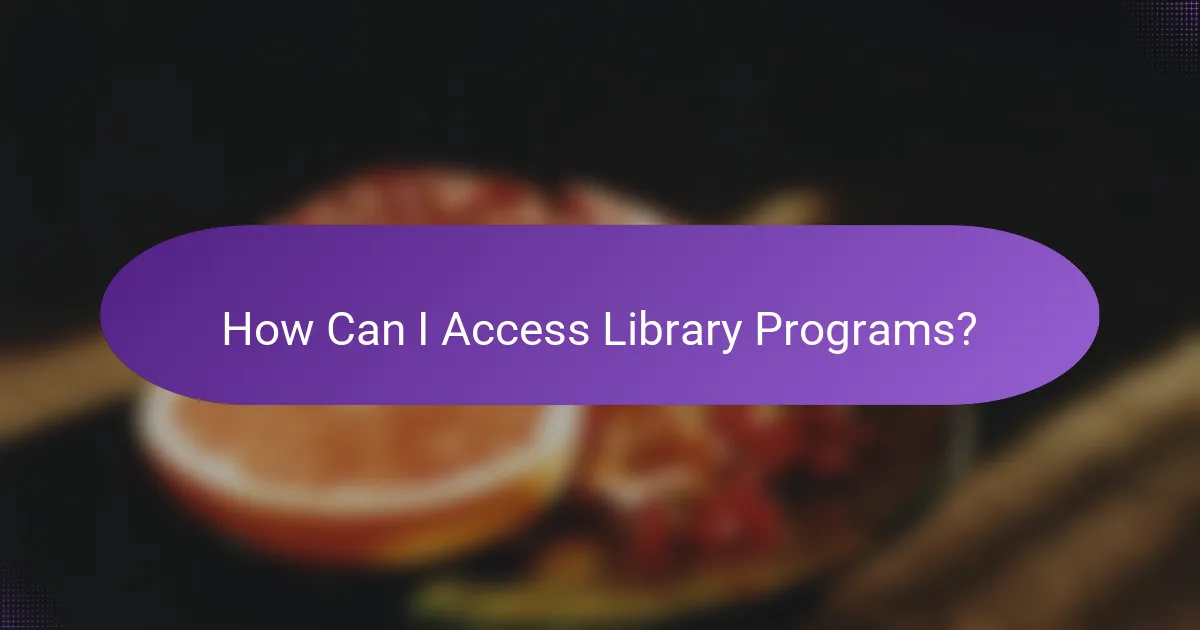
How Can I Access Library Programs?
You can access library programs through various methods, including online registration, in-person sign-ups, and membership registration. Each method offers unique benefits depending on your preferences and availability.
Membership Registration
To participate in library programs, you typically need to register for a library membership. This process usually involves filling out a form with your personal details, such as name, address, and contact information. Many libraries offer free membership, while some may charge a nominal fee.
Once registered, you will receive a library card that grants you access to various resources, including programs, events, and borrowing privileges. Be sure to check if your library has specific eligibility requirements or age restrictions for certain programs.
Online Program Sign-Up
Most libraries provide an online platform where you can sign up for programs and events. This option is convenient, allowing you to browse available programs, check schedules, and register from the comfort of your home. Look for the ‘Events’ or ‘Programs’ section on your library’s website.
When signing up online, ensure you have your library card number handy, as it may be required for registration. Some programs may have limited spots, so it’s advisable to register early to secure your place.
In-Person Registration
If you prefer a more personal touch, you can register for library programs in person. Visit your local library during operating hours and ask about upcoming events. Library staff can assist you with the registration process and provide additional information about the programs.
In-person registration is also a great opportunity to ask questions and learn about other resources available at the library. Keep in mind that some programs may require you to register in advance, while others may allow walk-ins, so check the specific guidelines for each program.
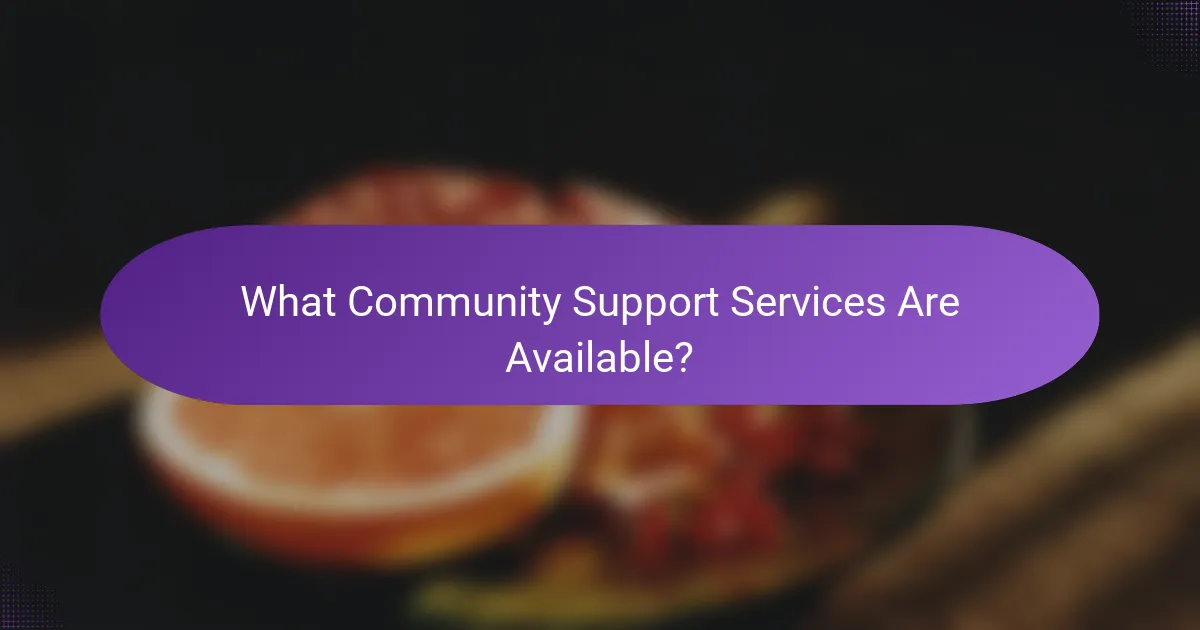
What Community Support Services Are Available?
Community support services offered by public libraries include various programs aimed at enhancing literacy, aiding job seekers, and promoting health and wellness. These resources are designed to meet the diverse needs of the community, providing valuable assistance and educational opportunities.
Literacy Programs
Public libraries frequently host literacy programs that cater to individuals of all ages, focusing on reading, writing, and digital literacy. These programs may include one-on-one tutoring, group classes, and workshops designed to improve essential skills.
For example, many libraries offer English as a Second Language (ESL) classes, which help non-native speakers enhance their language proficiency. Participants can expect to engage in interactive activities that build confidence and competence in reading and communication.
Job Search Assistance
Job search assistance is a vital service provided by libraries, offering resources such as resume writing workshops, interview preparation sessions, and access to job databases. These services help job seekers navigate the employment landscape more effectively.
Many libraries also provide access to computers and internet resources, allowing individuals to search for job openings and submit applications online. Additionally, some libraries host career fairs and networking events to connect job seekers with local employers.
Health and Wellness Workshops
Health and wellness workshops at public libraries focus on promoting physical and mental well-being through various educational programs. These workshops may cover topics such as nutrition, stress management, and exercise routines.
Libraries often collaborate with local health organizations to provide expert-led sessions that are free or low-cost. Participants can learn practical strategies for maintaining a healthy lifestyle and may also receive resources for further support in their health journeys.
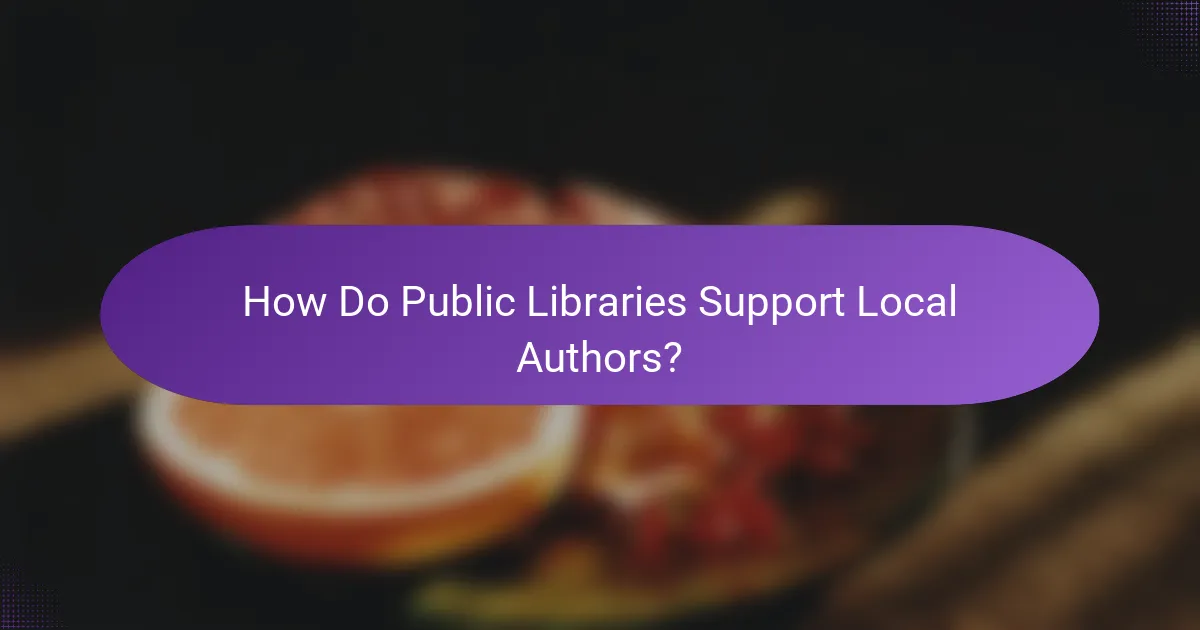
How Do Public Libraries Support Local Authors?
Public libraries play a vital role in supporting local authors by providing resources, programs, and community engagement opportunities. They create an environment where writers can thrive through events, access to self-publishing tools, and educational workshops.
Author Events
Public libraries frequently host author events, including book signings, readings, and panel discussions. These events allow local authors to showcase their work, connect with readers, and network with other writers. Libraries often promote these events through their websites and social media, increasing visibility for participating authors.
Additionally, libraries may offer opportunities for authors to present their books in a supportive setting, helping to build a local readership. Authors can benefit from feedback and interaction with their audience, which can be invaluable for future projects.
Self-Publishing Resources
Many public libraries provide resources for self-publishing, including access to software, guides, and databases. Authors can find tools for formatting their manuscripts, designing covers, and navigating the publishing process. Some libraries even offer workshops on self-publishing platforms like Amazon Kindle Direct Publishing or IngramSpark.
In addition to physical resources, libraries may provide access to online courses or webinars that cover various aspects of self-publishing. This support can help authors understand the market and make informed decisions about their publishing journey.
Writing Workshops
Writing workshops at public libraries are designed to help local authors improve their craft and gain valuable skills. These workshops often cover topics such as character development, plot structure, and editing techniques. Participants can receive constructive feedback from peers and instructors, fostering a collaborative learning environment.
Libraries may host workshops led by experienced authors or writing coaches, making them accessible to writers of all skill levels. Many workshops are free or offered at a low cost, ensuring that financial barriers do not prevent aspiring authors from participating.

What Are the Benefits of Library Membership?
Library membership offers numerous advantages, including access to a wealth of resources, community programs, and exclusive events. Members can enjoy free or discounted services that enhance their educational and recreational experiences.
Access to Exclusive Content
Library members gain access to exclusive content such as e-books, audiobooks, and online databases that are not available to the general public. Many libraries partner with digital platforms to provide members with a vast selection of materials, often including popular titles and academic resources.
Additionally, libraries frequently offer workshops and seminars that delve into specific topics, allowing members to deepen their knowledge and skills. This exclusive access can significantly enhance personal and professional development.
Discounts on Local Events
Membership often includes discounts on local events, such as cultural performances, lectures, and workshops. Libraries collaborate with community organizations to provide members with reduced ticket prices or free admission to various activities, fostering community engagement.
For instance, members might receive discounts for art exhibitions, film screenings, or author talks, making it easier to participate in local culture without straining their budgets.
Networking Opportunities
Joining a library can open doors to valuable networking opportunities. Many libraries host community events that bring together individuals from various backgrounds, allowing members to connect with like-minded people and professionals in their fields.
Participating in book clubs, discussion groups, or volunteer programs can help members expand their social and professional networks, which can lead to collaborations, mentorships, or job opportunities. Engaging with the library community can be a strategic move for personal growth and career advancement.
